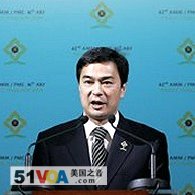Phuket, Thailand
20 July 2009
 |
| Thai Prime Minster Abhisit Vejjajiva addresses opening ceremony of 42nd Association of Southeast Asian Nations, ASEAN, in Phuket, 20 Jul 2009 |
Prime Minister Abhisit Vejjajiva says the Association of Southeast Asian Nations needs to be a community of action.
"ASEAN must be able to act decisively and in a timely manner to address both internal and external threats and challenges to the security and welfare of its member states and peoples," he said. "Effective action must replace extended deliberation. We must show to the world that ASEAN is ready to meet any challenge and is well prepared to act decisively."
ASEAN has long been criticized as a talking shop because of its tradition of acting only on consensus.
But in May Thailand, the current chair, issued its strongest criticism yet of member state Burma for its prosecution of democracy and opposition leader Aung San Suu Kyi and jailing of political prisoners.
The trial of Aung San Suu Kyi, on charges of violating the terms of her detention, and Burma's rights abuses are in focus as the ministers agreed on the terms of the region's first human rights body.
Full details of the body's functions have not yet been released, but officials say it will not have the power to investigate or punish human rights abusers such as Burma.
Mr. Abhisit told journalists Monday this does not mean that protection of human rights will be ignored. He says while the body will first focus on the promotion of human rights, protection will come later.
"But it's better to make a start than to leave this hanging with no progress at all," he said. "So, we recognize the concerns of people who work on this issue, we will take them on board and we will do what we can."
Foreign ministers from ASEAN's 10 members on Monday began four days of meetings on improving regional cooperation.
The ministers are expected to discuss challenges affecting the region, including terrorism, the economic crisis, influenza pandemic, and climate change, among other issues.
They meet later in the week with dialogue partners from 17 nations and groups of nations, including the European Union, the United States, and North Korea.
Thailand wants to arrange an informal meeting of the six nations involved in talks on ending North Korea's nuclear programs. But, in a sign that Pyongyang is not interested, the reclusive nation plans to send a lower-level official rather than a foreign minister.